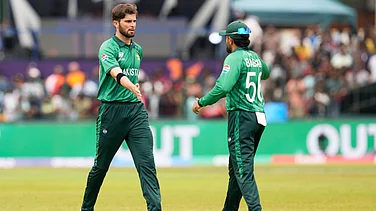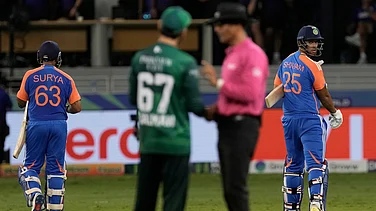In that wide swathe of area that we could label as the non-third world, the general trend is for a rougher brand of justice in direct proportion to the level of public acceptance. The rule seems to be: the higher the wattage of adulation bestowed on an individual by society, the more should his or her accountability be. On the subcontinent, it's just the opposite. The mean tolerance level of criminal culpability of any kind suddenly seems to have touched a new high. The fact that a sitting Lahore High Court judge has, so to say, passed a judgment against Wasim Akram and five others has neither excited Akram's fans at large nor has it moved cricket administrators to do what should have perhaps been done two years ago-enforce bans on their careers. Acceptance of verdicts should, after all, not be any less important than their passing.
In Pakistan, we are seeing-with the solitary exception of Salim Malik-the return of the tainted players to the international arena. Mushtaq Ahmed is facing a life ban but has been selected for the Australia tour. The others-Akram, Inzamam-ul-Haq, Saeed Anwar and Ejaz Ahmed-return, grinning from ear to ear, facing only fines ranging from Rs 2-5 lakh.The International Cricket Council is so limp in both law and will that, in spite of a conduct commission, it prefers to wait out the storm from the sidelines-a referee content watching a bout with hands crossed across the chest as the opponents hit below the belt, bite whole ears, and head butt at will. Says Waheed Khan of The News, which broke the story on the bans and fines: "The commission also recommended that Akram be removed as captain of the Pakistani team and a close watch be kept on his activities in future. About the other players, the judge says he's convinced that 'they were not entirely straight in their statements to the commission, or in their activities at some period of time'."
The depositions against the guilty players, first reported by Outlook in February this year, offered remarkable insights into cricket's underbelly. The testimony of Saleem Parvez, a former employee of the National Bank of Pakistan, proved crucial with respect to both Malik and Mushtaq Ahmed. Parvez said, "Mushtaq and Malik received $100,000 from me on behalf of someone for fixing the match in Sri Lanka. The amount was paid so that Pakistan lose the match, which they did. They were playing against Australia. I had acted on behalf of my friends. I had taken this money to Sri Lanka as I knew the team was going to sell the matches. I thought why should I not try. I handed the dollars to both of them who were together in their hotel room. They asked me for a larger sum of money but I told them that I only had $100,000."
In fact, if pace bowler Ata-ur-Rahman had stuck to his earlier testimony, a life ban could have been coming Akram's way as well. Rahman had this to say about Akram: "Akram himself had given me money to play badly. While I was in England, Akram prevailed upon me to give an affidavit to the effect that the earlier affidavit submitted by me was under coercion. At that time I was in Newcastle. Akram asked me to come over to Manchester where he threatened me with dire consequences and said that he was stronger than me in Pakistan...When we returned to Pakistan from New Zealand, Akram gave me Rs 100,000 and promised to pay the remaining amount if I continued indulging in match fixing. Subsequently, my mother fell ill and my sister was operated upon and my conscience pierced me with the result that I stopped becoming a party to it. "
While Rahman is currently facing contempt proceedings for changing his statement yet again, it was former wicketkeeper Rashid Latif's testimony that has possibly resulted in Inzamam, Anwar and Ejaz being fined. Latif said, "In '94 we toured New Zealand. Before the fifth one-dayer at Christchurch, Salim Malik, who was the captain, called me to his room. I went there and found three, four players there. I can't disclose their names as they are not the main culprits, though the entire team is involved in match fixing and betting. Malik told me we had to lose the match as he had struck a deal with somebody. I was offered Rs 10 lakh by Malik. I told him I would think over the matter. It was obvious that the other players there must have also been offered money. The next morning, when I took the catch of a batsman, Malik reprimanded me. During the break I told Malik I was not going to be a party to the fixing."
With pressure building up on President Rafiq Tarar to act on the recommendations of the report, it is likely that he himself is trying to gauge the position of General Musharaff and his gang on the issue. Ironically then, it is with the coup leaders that the fate of cricket's international image lies. The recommendations will, in fact, be a good test to ascertain whether the changed guard means business. The last word, however, belongs to Fareshteh Aslam Gatti, a senior journalist at The News: "In Pakistan, at least we have the comfort of knowing that the judiciary did a credible job of the inquiry. What about the bcci's own inquiry?" In short, is the bcci content being former chief justice Y. Chandrachud's conscience-keeper?






















